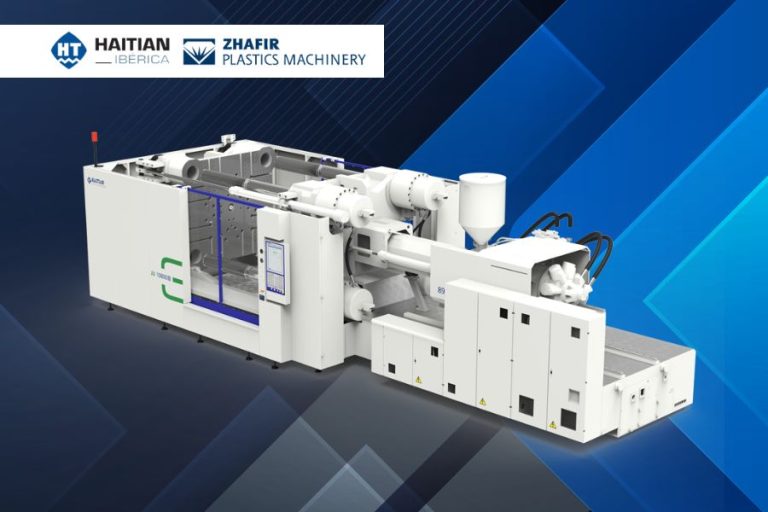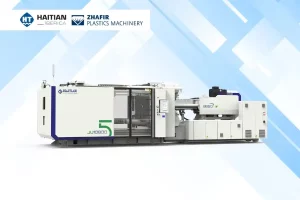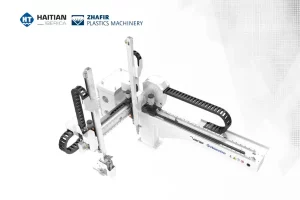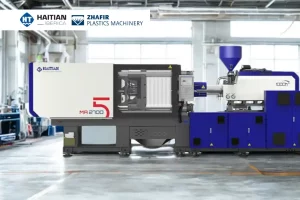The world of plastic injection molding is vast and complex, but choosing the right machine can be much easier if you know the key details. Each type of injection molding machine has its own characteristics, benefits, and specific applications. With this guide, we aim to help you understand the differences and make an informed decision for your production project. Let’s explore the different types of injection molding machines and how to choose the one that best suits your needs.
What is Injection Molding?
Injection molding is one of the most widely used plastic manufacturing processes in the industry. Its versatility allows for the creation of a wide variety of plastic products, from small, detailed parts to larger components, all with high precision and efficiency.
This process involves injecting molten plastic at high pressure into a mold. Once the material cools and solidifies, a piece with the shape of the mold is obtained. This method is widely used because of its ability to mass-produce parts, as well as the quality and detail that can be achieved in the final products.
Injection Molding Machines and Their Main Classification
In the market, there are different types of injection molding machines that adapt to the diverse needs of the plastic industry. Choosing the right machine depends on factors such as the type of material to be used, mold size, production requirements, and energy consumption, among others.
What Types of Injection Molding Machines are Used in the Plastic Industry?
Injection molding machines can be classified into three main types:
- Hydraulic machines
- Electric machines
- Hybrid machines
Each of these options has specific features that make them suitable for different applications and sectors of the plastic industry.
Hydraulic Injection Molding Machines
Hydraulic injection molding machines are the most traditional and common in the industry. They work with a system of hydraulic cylinders that provide the force needed to close the mold and maintain pressure during the injection of the plastic.
Advantages of hydraulic machines:
- Sturdiness and Durability: These machines are designed to work under high pressure and with heavy loads, making them ideal for large parts.
- Versatility: They can be used with a wide range of plastic materials, from polyethylene to technical plastics.
- Affordable Cost: They generally have a lower initial cost compared to electric machines.
- Common Applications: They are used to produce large volumes of industrial parts, automotive components, and household items.
Electric Injection Molding Machines
Electric injection molding machines work with servomotors that control all movements of the machine, such as mold closing and material injection. They are more recent and are aimed at optimizing energy efficiency and process precision.
Advantages of electric machines:
- High Precision: With more precise control over each movement, they are perfect for producing parts where precision is critical.
- Energy Efficiency: They consume less energy, as the electric motors only activate when needed, rather than running continuously like hydraulic systems.
- Lower Noise and Cleanliness: Without hydraulic oil, they reduce the risk of contamination and produce less noise.
- Common Applications: They are used in sectors where quality and precision are essential, such as medical, electronics, and high-tech products.
Hybrid Injection Molding Machines
Hybrid machines combine the advantages of hydraulic and electric machines. They use both electric motors and hydraulic systems, which allows them to leverage the best of both technologies.
Advantages of hybrid machines:
- Cost and Efficiency Optimization: They combine the energy efficiency of electric systems with the power of hydraulic systems.
- Versatility of Application: They can handle large parts or fast cycles without sacrificing precision.
- Common Applications: They are ideal for varied production, from technical parts that require precision to larger, heavier components.
How to Choose the Right Injection Molding Machine?
Choosing the right injection molding machine for your operation requires considering several factors that will define which is the best option for your specific needs. Here are some recommendations:
Type of Product to Be Manufactured
- If you need to produce large, strong parts, a hydraulic machine is the best option because of its clamping force and ability to handle large molds.
- If you work with detailed, high-precision parts, an electric machine will give you the control and quality you need.
- If you need a versatile machine that can adapt to both large parts and fast cycles, consider a hybrid machine.
Production Requirements
- Production Volume: For high-volume production, hydraulic machines are generally more suitable due to their durability and ability to work long cycles.
- Cycle Speed: If you need fast and efficient cycles, electric or hybrid machines can offer greater speed and efficiency.
Energy Consumption
- Electric machines stand out for their low energy consumption. If energy efficiency is key for you, this is the best option.
- Hybrid machines also offer a good balance of efficiency and power, suitable for those needing a balance between both aspects.
Initial and Maintenance Costs
- Hydraulic machines tend to have a lower initial investment cost, but maintenance can be higher due to the use of oil and hydraulic components.
- Electric and hybrid machines have a higher initial cost, but maintenance is simpler, and operating costs can be lower in the long run thanks to energy efficiency.
Available Space
- Consider the space available in your plant. Hydraulic machines are usually bulkier, while electric and hybrid machines tend to be more compact and cleaner.
What is the Most Common Injection Molding Machine?
Hydraulic injection molding machines stand out as the most common option on the market, mainly due to their affordable cost, durability, and ability to work with large production volumes. Although electric and hybrid machines have gained popularity in recent years due to their advantages in efficiency and precision, hydraulic machines remain the preferred choice for many companies looking for a robust and reliable solution for mass production.
Choosing the right injection molding machine will depend on your specific needs, the type of product you want to manufacture, your budget, and the conditions of your operation. Hydraulic machines are an excellent choice if you are looking for power and durability to produce large volumes, while electric and hybrid machines offer important advantages in energy efficiency and precision.
At Haitian Ibérica, we are experts in the sale of injection molding machines of different types and technologies. We know that each client has unique needs, and we are here to help you find the machine that best suits your project.
Ready to Optimize Your Production?
At Haitian Ibérica, we offer a wide range of injection molding machines designed to meet the highest industry standards. Contact us today and let our team of experts guide you in finding the best solution for your business. Together, we’ll take your production to the next level!





